In an era increasingly defined by climate change, resource depletion, and biodiversity loss, the quest for a sustainable world has never been more urgent. Fortunately, eco-friendly technology is emerging as a beacon of hope, offering innovative solutions that promise to transform various sectors and pave the way for a more sustainable future.
The Rise of Renewable Energy
Solar Power Innovations
Solar energy has taken center stage in the renewable energy revolution. Innovations in photovoltaic technology, such as perovskite solar cells, are increasing efficiency and reducing production costs. These cells, which can be manufactured using abundant and cheaper materials, have the potential to make solar energy accessible to even the most remote locations. Furthermore, advances in solar panel recycling technologies are addressing concerns around waste, making the entire lifecycle of solar energy more sustainable.
Wind Energy Advances
Wind energy technology is also evolving. Turbine designs are becoming more efficient, with vertical axis wind turbines gaining traction due to their ability to capture wind from multiple directions. Offshore wind farms are expanding as well, with floating turbines that can be placed in deeper waters. This not only increases potential energy generation but also minimizes visual and noise pollution associated with traditional land-based turbines.
Smart Homes and Buildings
Energy Management Systems
The integration of technology within residential and commercial buildings is revolutionizing energy efficiency. Smart energy management systems utilize AI to optimize energy use by predicting consumption patterns and adjusting accordingly. Smart thermostats, lighting systems, and appliances can collectively reduce energy waste, leading to significant savings on utility bills and a lower carbon footprint.
Sustainable Construction Materials
The construction industry is undergoing a significant transformation with the introduction of eco-friendly building materials like bamboo, recycled steel, and mycelium (the root structure of mushrooms). These materials not only have a lower environmental impact during their lifecycle but also promote healthier living environments by reducing harmful emissions.
Transportation Revolution
Electric Vehicles (EVs)
Electric vehicles are arguably one of the most visible changes in the transportation sector. With advancements in battery technology, EVs are becoming more efficient, with longer ranges and shorter charging times. Innovations such as solid-state batteries promise to further enhance performance and safety, while expanding the market for EVs to include buses, trucks, and even ships.
Sustainable Public Transport
Public transportation is also evolving, with cities worldwide investing in electric buses, trams, and trains. These systems reduce reliance on fossil fuels and minimize congestion, leading to improved air quality. Innovations such as autonomous shuttles are being tested to offer flexible, on-demand services that meet the needs of urban commuters without compromising sustainability.
Circular Economy and Waste Management
Upcycling Technologies
As society moves toward a circular economy, new technologies are being developed to convert waste into valuable resources. Upcycling processes, which transform discarded materials into new products, are gaining attention. The use of AI in sorting recyclables and improving efficiency in recycling plants ensures that more materials are diverted from landfills.
Biodegradable Alternatives
The relentless rise of plastic pollution is prompting innovations in biodegradable materials. From bioplastics made from corn starch to algae-based packaging, these alternatives decompose more naturally, significantly reducing environmental impact. Companies are investing heavily in R&D to create scalable solutions that can replace conventional plastics.
Agriculture Meets Innovation
Precision Farming
The agricultural sector is reaping the benefits of eco-friendly technology as well. Precision farming utilizes IoT sensors, drones, and AI analytics to optimize irrigation, fertilization, and pest control. This not only increases crop yields but also minimizes the use of water and chemicals, reducing the overall environmental impact of farming practices.
Vertical and Urban Farming
As urbanization continues to rise, vertical and urban farming techniques are becoming more popular. These approaches allow food to be grown closer to consumers, reducing transportation emissions. Innovations in hydroponics and aeroponics are enabling farms to produce more food using less water and land, making agriculture more sustainable.
Conclusion
The future of eco-friendly technology holds tremendous promise for creating a sustainable world. As innovations continue to emerge across different sectors, the collective impact can lead to significant reductions in emissions, resource consumption, and waste. By embracing these technologies, businesses, governments, and individuals can contribute to a healthier planet and a more balanced coexistence with our environment. The journey toward sustainability may be complex, but with the right innovations at the forefront, a harmonious and eco-conscious future is within reach.


